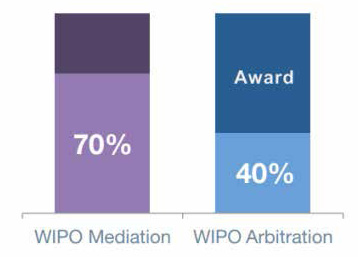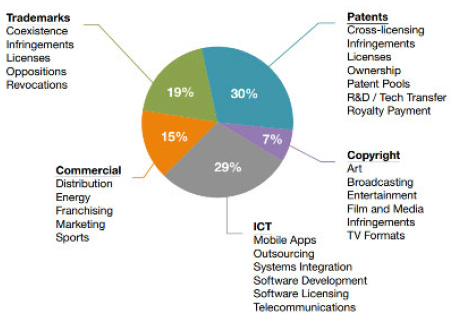The WIPO Arbitration and Mediation Center (“WIPO Center”) is a neutral, independent, impartial and non-profit provider of dispute resolution services tailored specifically for intellectual property, technology and related commercial transactions. The WIPO Center has been receiving a growing number of cases involving parties in Asia, which it administers from its office in Singapore in coordination with its headquarters in Geneva, Switzerland, under the WIPO Mediation, Arbitration, Expedited Arbitration and Expert Determination Rules.
The WIPO Arbitration and Mediation Center
The World Intellectual Property Organization (“WIPO”), headquartered in Geneva, Switzerland, is an intergovernmental organization with a mandate from 189 Member States to assist in the development of a balanced and effective intellectual property (IP) system that supports innovation and creativity for the benefit of all. In the event that disputes arise between private parties in relation to IP rights or commercial matters, WIPO offers alternative dispute resolution (“ADR”) services through its Arbitration and Mediation Center (“WIPO Center”).1 The WIPO Center is an internationally neutral, independent and non-profit provider of dispute resolution services tailored specifically for IP, technology and related commercial transactions, and the leading institution in the administration of domain name disputes.
Through its offices in Geneva and Singapore, the WIPO Center administers disputes globally pursuant to the WIPO Mediation, Arbitration, Expedited Arbitration and Expert Determination Rules (WIPO Rules).2 Developed by experts in cross-border dispute settlement and IP, the WIPO Rules address procedural matters relating to the conduct of WIPO case proceedings, and are designed to stimulate positive opportunities for party settlement and address the specific needs of IP and technology disputes. The WIPO Rules are either incorporated in the parties’ agreement or later agreed upon after a dispute has arisen.
The WIPO Rules are used by multinational corporations, SMEs, artists and inventors, R&D centers, universities and collecting societies around the world.
WIPO ADR Cases
WIPO ADR cases usually arise in the context of agreements related to licensing (eg, trademarks, patents, copyright, software), research and development, technology transfer, distribution, franchising, Information Technology, joint ventures, consultancy, artistic production finance, art marketing, TV distribution rights, as well as instances arising out of agreements in settlement of prior court litigation.
The diagram below indicates the frequency of the different types of disputes administered by the Center in recent years.
Seventy five per cent of WIPO cases are international, involving parties from more than one country, and 25 per cent are domestic. One example of a domestic case is a dispute between two Singaporean parties arising from a franchising agreement, which was submitted to the WIPO Center in accordance with a submission agreement nominating the WIPO Mediation Rules.
Amounts in dispute in WIPO ADR cases have ranged from USD 15,000 to 1 billion. The remedies claimed in arbitration proceedings have included: damages, infringement declarations and specific performance, such as a declaration of non-performance of contractual obligations, or of infringement of rights, further safeguards for the preservation of confidentiality of evidence, the provision of a security, the production of data, the delivery of goods and the conclusion of new contracts.
Parties using WIPO ADR services enjoy positive settlement success. To date, 70 per cent of WIPO Mediation cases settle within just a few months,3 most often including a single, day-long session with the mediator.4

Another factor leading to the high settlement success rate relates to the long-term commercial relationships specific to many IP transactions, for example, collaborations in the development of new products or commercial exploitation of new technologies.
Careful drafting of an “escalation clause”, whereby parties submit potential disputes to WIPO Mediation, followed, in the absence of settlement, by (Expedited) Arbitration can also increase the chances for settlement. Such clauses, included in some 40 per cent of the cases submitted to the WIPO Center, allow parties to first put aside the legal merits of the case to mediate commercial interests in an informal setting, prior to resorting to a more formal, legal arbitration procedure, if needed.
In addition to the recommended model WIPO Contract Clauses and Submissions Agreements,5 the WIPO Center makes available online a Clause Generator that allows users to “build” dispute resolution clauses tailored to suit party needs. The freely available tool can be used for future or existing disputes, WIPO Mediation, Arbitration or Expedited Arbitration,6 or appropriate combinations, and allows for the inclusion of a number of core and additional listed elements.
In the event that parties or their counsel prefer a more personalized approach, the WIPO Center is available to assist in considering and drafting an adequately tailored dispute resolution clause for a particular agreement or existing dispute.
As a resource hub, the WIPO Center promotes the use of ADR through workshops and conferences,7 publications,8 working documents and research tools.9
The Role of the WIPO Center in Geneva and Singapore
To facilitate the resolution of disputes, the WIPO Center helps parties submit existing disputes to WIPO procedures in cases where they had not previously agreed on a WIPO clause.10
Once a case is submitted, the WIPO Center engages in active case management to optimize the time- and cost-efficient resolution of the dispute. Of principal importance in this respect, is the assistance provided to parties in the selection of mediators, arbitrators and experts from the WIPO Center’s database of over 1,500 neutrals located around the world, each with specific IP and technology background expertise.11
The WIPO Center sets the neutrals’ fees, after consultations with the parties and the neutrals, and administers the financial aspects of the proceedings. The WIPO Center makes available an online ADR fee calculator so parties can estimate administration fees and costs of WIPO ADR procedures in advance.12
In its case administration, the WIPO Center liaises with parties and neutrals to ensure optimal communication and procedural efficiency. If the parties wish, the WIPO Center can also arrange for meeting support services, including hearing rooms and caucus rooms. While parties are free to hold meetings and hearings wherever they decide, where the procedure is held at WIPO in Geneva, state of the art facilities are provided free of charge.13 WIPO can also arrange for facilities at Maxwell Chambers in Singapore at special rates.
IP offices in Asia receive the highest numbers of applications for patents, utility models, trademarks and industrial designs, including some 62 per cent of all patent applications worldwide in 2015,14 providing for growing opportunities to commercialize IP globally. Consequently, the number of disputes involving IP elements submitted to the WIPO Center and bearing connection to the Asia/Pacific region has grown significantly since it opened its Singapore office in 2010.
Article 4 WIPO Mediation Rules: Unilateral Request for Mediation
To improve access to ADR options, since 2016 the WIPO Mediation Rules allow private parties to unilaterally request WIPO Mediation with another party in the absence of a dispute resolution clause or a contractual relationship between the parties (e.g. in IP infringement cases or in cases pending before the courts).
Article 4(a) of the WIPO Mediation Rules stipulates that a party may submit a Request for Mediation in the absence of a Mediation Agreement. In order to facilitate the filing of the Request, the WIPO Center makes available a unilateral Request for Mediation form15 for the requesting party to insert the contact information of both parties and a brief statement of the nature of the dispute16. Upon the requesting party’s electronic submission of the form, with the responding party on copy, the WIPO Center may explain to the responding party how the WIPO Mediation Rules would apply and govern the procedure in the potential case at hand.
The Mediation Promotion Scheme for IPOS Proceedings
At their request, the WIPO Center develops tailored dispute resolution mechanisms for national Intellectual Property Offices, and can also provide corresponding procedural advice and case administration services for certain types of disputes pending before them.
The Intellectual Property Office of Singapore (“IPOS”) and the WIPO Center have jointly established a voluntary mediation option giving parties a flexible tool to settle disputes amicably, without a hearing at IPOS and at a discounted rate.17 Within this scheme, IPOS proactively informs and encourages parties engaged in trademark opposition, invalidation or revocation proceedings pending before it to submit their dispute to WIPO Mediation at the First Case Management Conference.18 The parties may submit the dispute to WIPO Mediation at any time before a final decision is issued, further to which IPOS will suspend the proceedings during 30, 60 or 90 days so that the mediation does not interfere with the IPOS internal office procedures. Within two weeks of the end of the mediation, the parties shall inform IPOS in writing whether the dispute is settled or some issues remain to be adjudicated at IPOS.
As of April 1, 2016, and until 30 March 2019, IPOS has introduced a Mediation Promotion Scheme allowing for the funding of the parties’ mediation costs up to SGD 5,500 per mediation case, provided that the parties (1) disclose any agent fees incurred from the start to the end of the IPOS proceedings, (2) give feedback on their mediation experience, and (3) allow a “shadow” mediator to sit in and observe the mediation. The parties may obtain reimbursement regardless of the outcome of the mediation.19
One case submitted to the WIPO Center pursuant to the Mediation Promotion Scheme involved parties from Europe and Singapore who sought the assistance of a WIPO neutral to settle a four-year-long dispute concerning the registration of trademarks in the United States, Canada, Europe and Asia, and the marketing and merchandising of collateral products. The mediation session was partly conducted by video-conference, lasted 11 hours (including the drafting of the Settlement Agreement), led to a global settlement of the dispute and the costs of the mediation were fully reimbursed pursuant to the Mediation Promotion Scheme.
Advantages of ADR for Resolving IP and Technology Disputes
ADR procedures, facilitating dispute resolution through private proceedings rather than before national courts, offer certain potential advantages for resolving IP, technology and related commercial disputes for several reasons. Of primary importance are the time and cost often associated with resolving disputes via litigation. ADR procedures typically result in faster and less expensive dispute solutions, allowing parties to return their focus to core activities. On a related note, the internationalization of the creation and commercialization of IP can benefit from cross-border solutions. ADR procedures bring the dispute into one procedure, avoiding the possibility of court litigation in multiple jurisdictions.
Furthermore, the technical and specialised nature of IP benefits from the appointed mediator, arbitrator(s) or expert having specific knowledge of the area of IP and in the industry and technology concerned. An informed neutral is a significant benefit where the short cycles of IP products justify the need for a quick resolution to avoid freezing the value of the underlying assets.
Because of its private nature, ADR affords parties the opportunity to exercise greater control over the way their dispute is resolved than would be the case in court litigation. The WIPO Rules include relevant provisions on the confidentiality of its procedures, including on evidence submitted by parties.
ADR also provides flexibility to parties not available with court litigation. For example, parties decide on the place and language of the proceedings and, in the case of arbitration, the applicable law. Parties may also set appropriate timelines and delineate certain processes, such as the scope of discovery. Furthermore, ADR can be neutral to the law, language and institutional culture of the parties, thereby avoiding any home court advantage that one of the parties may enjoy in court-based litigation, where familiarity with the applicable law and local processes can offer significant strategic advantages.
Conclusion
In light of the increasing complexity and specialization in many areas of IP, coupled with the rapid evolution of legal conditions and business needs, the WIPO Center’s activities demonstrate its dedication to facilitate optimal resolution of disputes for private parties. The WIPO Center’s innovative, confidential and efficient ADR procedures enable parties to limit disruption to their commercial activities and quickly return to their business.
The WIPO Center has experienced a considerable increase in IP, technology and commercial related cases in recent years. The momentum gained is evidenced by responses to the 2016 Queen Mary University Survey on Technology, Media and Telecommunications Disputes, which noted that the WIPO Center is the second most used institution for TMT disputes globally and is “favoured in relation to IP matters.”20
Whether the parties are based in the Singapore region or elsewhere in Asia or the world, the WIPO Center legal team stands ready to meet their dispute resolution needs.

► Olivier Marquais
Legal Officer
Representative of WIPO Arbitration and
Mediation Center, Singapore Office
For more information contact:
WIPO Arbitration and Mediation Center (Geneva)
34, chemin des Colombettes
CH-1211 Geneva 20
Switzerland
T + 41 22 338 82 47
WIPO Arbitration and Mediation Center (Singapore)
Maxwell Chambers
32 Maxwell Road #02-02
Singapore 069115
T +65 6225 2129
www.wipo.int/amc
Olivier Marquais is a Legal Officer at the Arbitration and Mediation Center of the World Intellectual Property Organization (“WIPO”) and currently the Representative of the WIPO Center at Maxwell Chambers in Singapore.
At the WIPO Center, Mr Marquais administers and manages arbitration and mediation cases mostly arising out of cross-border intellectual property and technology related disputes. As Representative of the WIPO Center’s external office in Singapore, he is also responsible for the establishment and promotion of WIPO alternative dispute resolution services and collaboration with government and private stakeholders across the Asia-Pacific region.
Mr Marquais is a French lawyer admitted in New York holding an LL.L and a J.D from the University of Ottawa and an LL.M in Public International Law from the University of Kent. Before joining WIPO in 2016, Olivier was an associate at an international arbitration law firm in Geneva.
Notes
1 “[T]he underlying reason for the establishment of the Center was a belief in the specificity of intellectual property as a subject matter, and, thus, of disputes concerning intellectual property, coupled with the conviction that arbitration, and other dispute-resolution alternatives offered particularly suitable means of accommodating the specific characteristics of intellectual property disputes.” Francis Gurry, The WIPO Arbitration and Mediation Center and its Services, The American Review of International Arbitration, Vol. 5, No. 2, 1994, pp. 197-201.
2 The WIPO Mediation, Arbitration and Expedited Arbitration Rules came into force on October 1, 1994, and were updated in 2014 and 2016. In 2007, the WIPO Center issued the WIPO Expert Determination Rules. The WIPO Rules are available online at www.wipo.int/amc/en/rules/, and are also available in Chinese, Japanese and Korean.
3 WIPO Mediation cases have been conducted over shorter periods to ensure compliance with timelines when the parties have suspended court proceedings to explore settlement or need the assistance of an expert in a technical or scientific matter.
4 In some cases, the parties have agreed with the mediator to hold the mediation session via tele- or video-conference.
5 WIPO Model Clauses are available in ten languages including Chinese, Japanese and Korean, and can be found at www.wipo.int/amc/en/clauses/.
6 The procedural characteristics of a WIPO Expedited Arbitration include the following: the filing of the Statement of Claim with the Request for Arbitration and of the Statement of Defense with the Answer, the arbitral tribunal is composed of one arbitrator, submissions are filed within 20 days of each other, the hearing date is set within 30 days of the Answer/Statement of Defense, the proceedings are closed within 3 months of the Answer/Statement of Defense, the Final Award is rendered within 1 month of the closure of the proceedings and the arbitrator’s fees are fixed at USD20,000 (if the amount in dispute does not exceed USD2.5 million) or USD40,000 (if the amount in dispute is over USD2.5 million and does not exceed USD10 million). The Center’s fees are lower in a WIPO Expedited Arbitration (registration fee of USD1,000, and administration fee of USD1,000 for an amount in dispute not exceeding USD 2.5 million). More information on WIPO Expedited Arbitration is available at: www.wipo.int/amc/en/arbitration/what-is-exp-arb.html.
7 www.wipo.int/amc/en/events.
8 www.wipo.int/amc/en/publications.
9 www.wipo.int/amc/en.
10 The WIPO Center also advises parties on the types of clauses to resolve future disputes for insertion in a contract and also provides procedural guidance to facilitate the submission of an existing dispute (i.e. Good Offices).
11 WIPO neutrals are appointed after consideration of neutrality (vis-à-vis nationality of the parties and their representatives), impartiality, independence, language and location of proceedings, knowledge of the governing substantive and procedural law and the area of IP law and the technical or business area concerned, and experience in ADR proceedings.
12 Available at http://www.wipo.int/amc/en/calculator/adr.jsp.
13 A charge is made for any other support services that may be required. This charge is separate from the Center’s administrative fee.
14 WIPO IP Facts and Figures 2016, p. 19, available at: www.wipo.int/edocs/pubdocs/en/wipo_pub_943_2016.pdf.
15 The Request for Mediation form is available at www.wipo.int/amc/en/docs/request_mediation.docx.
16 Pursuant to Article 3(b)(i) and (iii) of the WIPO Mediation Rules.
17 WIPO’s non-profit schedule of Fees and Costs is available at www.wipo.int/amc/en/center/specific-sectors/ipos/mediation/fees.html.
18 Parties receive information relating to the WIPO Mediation Option after the filing of their initial pleadings (i.e. the applicant’s notice of opposition or application for revocation or invalidation, and the proprietor’s counterstatement).
19 Applications for reimbursement shall be filed within one month of the date of the invoice from the WIPO Center.
20 School of International Arbitration, Queen Mary University of London, “International Dispute Resolution Survey: Pre‑empting and Resolving Technology, Media and Telecom Disputes”, available at www.arbitration.qmul.ac.uk/docs/189659.pdf.




